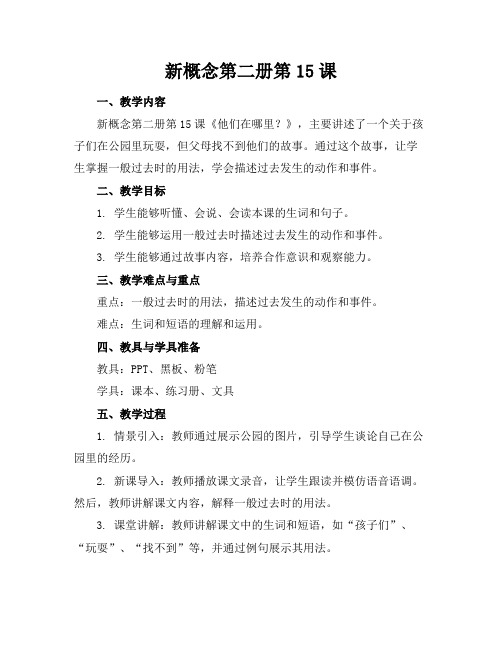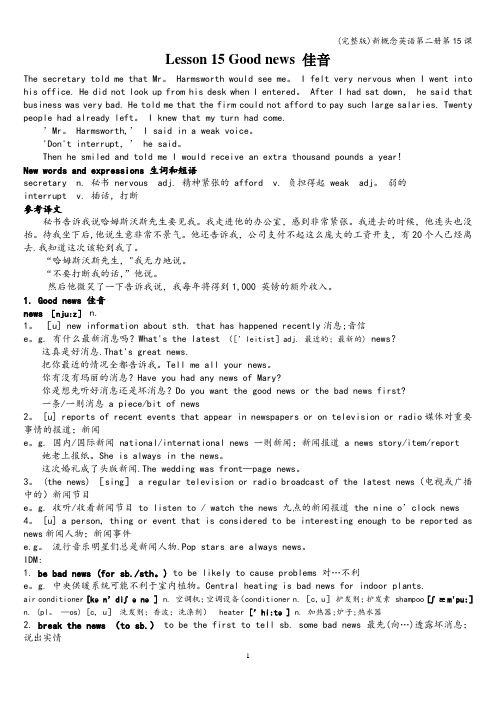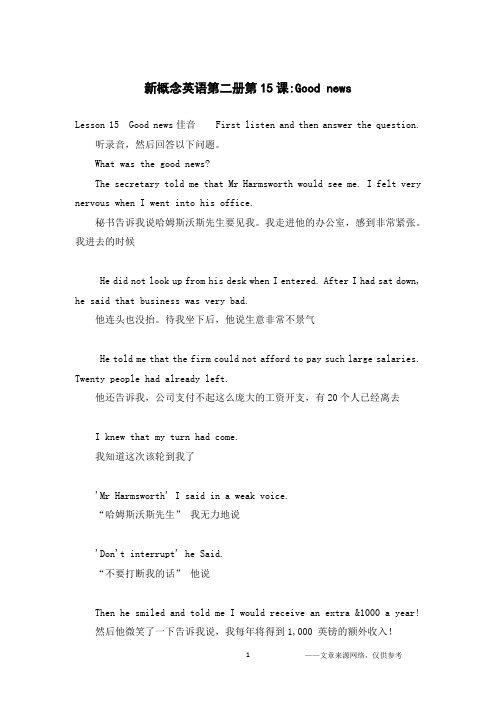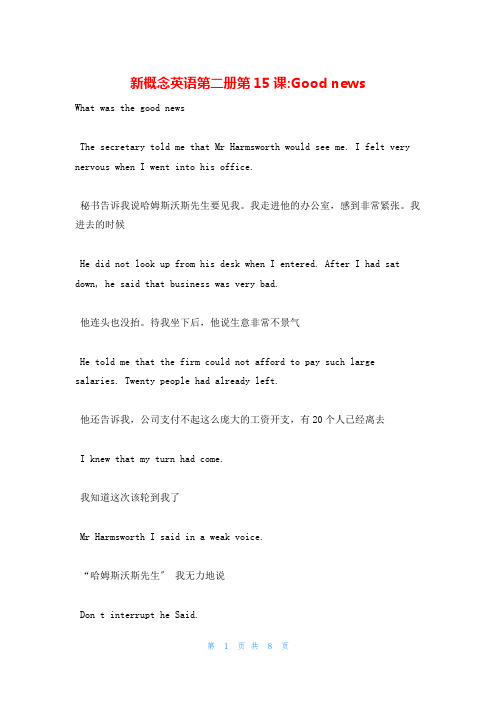新概念英语第二册第15课
新概念英语第二册第十五课课件Lesson15_good_news

He is nervous.
• nervous ['nə:vəs] adj. 精神紧张 的 神经
• nerve [nə:v] n. 神经 • 短语:
• be nervous about • 对…. 感到紧张
• Eg: Are you nervous about the English exam?
直接引语(变化前) 现在进行时
间接引语(变化后) 过去进行时
“I’m making coffee for you all,” she She said she was making coffee
said.
for us all.
Grammer - 2 直接引语转换间接引语
2.6 转换中的要点总结2-时态的转换3
Grammer - 2 直接引语转换间接引语
转换中的要点总结2-时态的转换1
直接引语(变化前) 一般现在时
间接引语(变化后) 一般过去时
“I know it,” he said.
He said that he knew it.
Grammer - 2 直接引语转换间接引语
2.6 转换中的要点总结2-时态的转换2
He said, “I have been doing it for hours.”
He said he had been doing it for hours.
Grammer - 2 直接引语转换间接引语
2.6 转换中的要点总结2-时态的转换7
直接引语(变化前) 过去完成时
间接引语(变化后) 过去完成时
Eg:He interrupted me while I was speaking. Eg:You interrupted my thoughts.
新概念第二册第15课课件

新概念第二册第15课课件新概念第二册第15课是一堂语法课,主要讲述了“there be”句型的用法和注意事项。
这个句型在英语中是非常常见的,也是我们学习英语时需要掌握的一个基础知识点。
下面我会结合课件和自己的一些理解,对这个句型做一些简单的介绍和分析。
首先,让我们来看看这个句型的基本结构。
在英语中,使用“There be”句型时,需要将be动词与名词或代词连用,以表示某个地方存在某些事物。
例如,课件中给出的例句:“There is a book on the desk.”,就是一个典型的“There be”句型。
在使用这个句型时,我们需要注意几个问题。
首先是名词的单复数问题。
这个句型中的名词需要与be动词一致,因此需要遵循名词单复数的规则。
例如,“There are three books on the desk.”中的books就是复数形式。
除了名词单复数问题外,我们还需要注意有无冠词的区别。
有些情况下,“There be”句型中的名词前会带有不定冠词a/an,有些情况下则不带冠词。
通常情况下,出现具体的物品时需要使用冠词,而出现抽象的概念时则不需要。
例如,“There is a pen o n the desk.”中的pen是具体的物品,因此前面需要使用冠词a。
此外,我们还需要注意这个句型的否定和疑问形式。
在否定形式中,需要在be动词之后加上not,例如“There is not a book onthe desk.”;而在疑问形式中,则需要将be动词和主语颠倒,例如“Is there a book on the desk?”。
除了这些注意事项之外,我们还可以在实际运用中提高这个句型的使用效果。
例如,在描述某一个地点时,可以使用“There be”句型来介绍这个地方所包含的事物或设施。
在写作或演讲中,也可以利用这个句型来引入主题或话题,让听众更好地理解和关注。
综上所述,新概念第二册第15课所介绍的“There be”句型是英语中非常重要的基础语法之一。
新概念英语第二册第15课课文+笔记+单词讲解

Lesson15Good news佳音What was the good news?The secretary told me that Mr.Harmsworth would see me.I felt very nervous when I went into his office.He did not look up from his desk when I entered.After I had sat down,he said that business was very bad.He told me that the firm could not afford to pay such large salaries.Twenty people had already left.I knew that my turn had come.'Mr.Harmsworth,'I said in a weak voice.'Don't interrupt,'he said.Then he smiled and told me I would receive an extra thousand pounds a year!参考译文秘书告诉我说哈姆斯沃斯先生要见我。
我走进他的办公室,感到非常紧张。
我进去的时候,他连头也没抬。
待我坐下后,他说生意非常不景气。
他还告诉我,公司支付不起这么庞大的工资开支,有20个人已经离去。
我知道这次该轮到我了。
“哈姆斯沃斯先生,”我无力地说。
“不要打断我的话,”他说。
然后他微笑了一下告诉我说,我每年将得到1,000英镑的额外收入。
【New words and expressions】(5)1secretary['sekrətəri,-teri]n.秘书2nervous['nə:vəs]a.精神紧张的3afford[ə'fɔ:d]v.负担得起4weak[wi:k]a.弱的5interrupt[ˌintə'rʌpt]v.插话,打断secretary['sekrətəri]n.秘书该词的词根是secret(秘密)secret['si:krit]n.秘密tell a secret告诉一个秘密keep a secret保守秘密the secret of success成功的秘密an open secret一个公开的秘密in secret秘密地secret adj.秘密地,保密的,不公开的a secret marriage一次秘密的婚礼a secret document一份秘密的文件secretary n.秘书,书记给大家推荐一个英语微信群Empty Your Cup英语微信群是目前学习英语最有效的方法,群里都是说英语,没有半个中文,而且规则非常严格,是一个超级不错的英语学习环境,群里有好多英语超好的超牛逼的人,还有鬼佬和外国美眉。
新概念第二册第15课

新概念第二册第15课一、教学内容新概念第二册第15课《他们在哪里?》,主要讲述了一个关于孩子们在公园里玩耍,但父母找不到他们的故事。
通过这个故事,让学生掌握一般过去时的用法,学会描述过去发生的动作和事件。
二、教学目标1. 学生能够听懂、会说、会读本课的生词和句子。
2. 学生能够运用一般过去时描述过去发生的动作和事件。
3. 学生能够通过故事内容,培养合作意识和观察能力。
三、教学难点与重点重点:一般过去时的用法,描述过去发生的动作和事件。
难点:生词和短语的理解和运用。
四、教具与学具准备教具:PPT、黑板、粉笔学具:课本、练习册、文具五、教学过程1. 情景引入:教师通过展示公园的图片,引导学生谈论自己在公园里的经历。
2. 新课导入:教师播放课文录音,让学生跟读并模仿语音语调。
然后,教师讲解课文内容,解释一般过去时的用法。
3. 课堂讲解:教师讲解课文中的生词和短语,如“孩子们”、“玩耍”、“找不到”等,并通过例句展示其用法。
4. 实践环节:教师组织学生进行角色扮演,模拟故事中的情景,让学生运用一般过去时描述动作和事件。
5. 随堂练习:教师发放练习册,让学生完成相关的练习题,巩固所学知识。
7. 作业布置:教师布置作业,让学生运用一般过去时写一篇小作文。
六、板书设计黑板上写出一句话:“他们在哪里?”然后,教师通过板书,将句子变成一般过去时的形式:“他们在哪里?”七、作业设计1. 作业题目:请用一般过去时写一篇关于你在公园里玩耍的小作文。
2. 作业答案:(示例)昨天,我和我的朋友们一起去公园玩耍。
我们跑了很长时间,玩得非常开心。
但是,当我们想找我们的父母时,我们发现他们不见了。
我们到处找他们,但找不到。
我们决定去附近的餐馆找他们,因为他们说要给我们买冰淇淋。
当我们到达餐馆时,我们终于找到了他们。
他们都坐在那里等着我们,我们非常高兴。
八、课后反思及拓展延伸本节课通过一个有趣的故事,让学生掌握了一般过去时的用法。
新概念第二册第15课课件

02 03
避免文化冲突
了解不同国家的文化特点,可以避免在交流中产生不必要的误解和冲突 。例如,在某些国家,直接询问对方的收入或婚姻状况可能被视为不礼 貌,而在其他国家则可能被视为友好的表现。
使用适当的语言
在不同的文化背景下,相同的语言可能有不同的含义。因此,在跨文化 交际中,使用适当的语言是非常重要的。了解不同国家的文化和习俗, 可以帮助我们选择更恰当的表达方式。
语法解析
总结词:重点语法
详细描述:本课的语法重点为现在完成时态,通过例句和练习,让学生掌握该时态的用法和结构,如 “I have written a letter”表示我已经写了一封信。
课文内容翻译及讲解
总结词:课文精讲
详细描述:本课课文主要讲述了一封信的写作过程,包括准备信封、贴邮票、写明信片等环 节。通过讲解课文,让学生了解英文书信的基本格式和写作技巧,同时学习相关词汇和语法 。
听录音,填空
题目
听录音,完成填空。
内容
提供一段录音,内容涉及日常对话或短文,学生 需要填写录音中提到的关键词或短语。
示例
录音内容为关于旅行的对话,学生需要填写缺失 的地点名词。
听录音,回答问题
题目
听录音,回答问题。
内容
提供一段录音,内容涉及日常对话或短文,学生需要回答关于录音 内容的问题。
示例
录音内容为关于电影的讨论,问题为“What is the name of the leading actor?”。
助动词。
填空题3
完成下列对话,填写适 当的短语或句子。
填空题4
在所给段落中填入合适 的词语或短语,使文意
连贯。
阅读理解
阅读理解1
阅读以下短文,回答问题。
新概念英语第二册Lesson15

secretary 秘书 nervous 紧张的 afford 负担得起 weak 弱的 interrupt 打断
Review the text
▪ The secretary told me that Mr. Harmsworth would see me. I felt very nervous when. I went into his office. He did not look up from his desk when I entered. After I had sat down, he said that business was very bad. He told me that the firm could not afford to pay such large salaries. Twenty people had already left. I knew that my turn had come. 'Mr. Harmsworth,' I said in a weak voice. 'Don't interrupt,' he said. Then he smiled and told me I would receive an extra thousand pounds a year!
▪ 10.Then he smiled and told me (that)I would receive an extra thousand pounds a year! 间接引语 然后他微笑了一下告诉我说,我每年将得
到1,000英镑的额外收入。
▪ =He said, ‘You will receive an extra thousand pounds a year.’ 直接引语
新概念英语2第15课 NCE2_Lesson15

• 8.(b)前一句中的短语 on the way是“在路上”的意思,只有(b) during the writer' s Journey(在作者旅途中)同这个短语意思最接近,而另外3个选择(a) before the writer'sjourney, (c)after,, journey和(d) a long time ago都与 它的意思不符。
• 11.(b)需要找出前一句中 replied(回答)的同义词。(a) responded(回答,答复) 作及物动词时后面要用that引导的宾语从句,如要表示对人或某种建议作出答 复,则要用to;(c) returned(同答,返回)词义不同于 replied;(d) remarked(评论, 议论,注意到)词义不符;只有(b) answered(回答)与 replied意思相同,面且这 两个词经常可以互相替换。
• 12.(b)只有选(b) almost这个句子的意思才通顺,而其他3个句子都讲不通,也 不符合语法。
句子结构答案
I do not know any French at all.
【New words and expressions】
secretary
Mr. Harmsworth
nervous
look up afford
e.g.:She is a nervous woman. e.g.: Do you see that nervous smile on her face? e.g.: He had never spoken in public, so he was very
nervous.
新概念英语第二册第十五课课件Lesson15-good-news只是课件

3) 你买得起这个样品。不是很贵。
You can afford this model. It’s not very expensive.
b) ( = to be able to spend [time] ,give, do, etc, without serious loss or damage表示“抽出 时间,能够常和 can, be able to, could 连用
4) 她对乘飞机旅行感到紧张。
She was nervous about travelling by air.
Look up
a) (= to raise one’s head) 抬头
我抬起头来看时,见到有学生静静地看着我。
When I looked up, I saw five students watching me quietly. b) (= to search or consult) 查阅,查找
直接引语和间接引语
• 当我们要引用某人的话或想法时, 可以 将某人说的话一字不改的引用,这叫 “直接引语”.
• 为了简洁和紧凑,我们通常用“间接引 语”, 即对原话作适当的改变,把说话的 内容和想法传达给第三者.
• 在间接引语中,时态,语序,代词及其它 词应该作相应的变化.
1. 如果引语的引述动词是现在时,将来时或现在 完成时,我们一般要用说话者原话中所用的语态.
新概念英语第二册第十五课课件 Lesson15-good-news
Summary writing
• Mr. Harmsworth wanted to see me. I felt very nervous about this. I went into his office. He said business was bad. The firm could not pay such large salaries. Twenty people had left already. He did not ask me to leave as well. He offered me an extra £1,000 a year. (53 words)
(完整版)新概念英语第二册第15课

Lesson 15 Good news 佳音The secretary told me that Mr。
Harmsworth would see me。
I felt very nervous when I went into his office. He did not look up from his desk when I entered。
After I had sat down, he said that business was very bad. He told me that the firm could not afford to pay such large salaries. Twenty people had already left。
I knew that my turn had come.’Mr。
Harmsworth,’ I said in a weak voice。
'Don't interrupt,’ he said。
Then he smiled and told me I would receive an extra thousand pounds a year!New words and expressions 生词和短语secretary n. 秘书 nervous adj. 精神紧张的 afford v. 负担得起 weak adj。
弱的interrupt v. 插话,打断参考译文秘书告诉我说哈姆斯沃斯先生要见我。
我走进他的办公室,感到非常紧张。
我进去的时候,他连头也没抬。
待我坐下后,他说生意非常不景气。
他还告诉我,公司支付不起这么庞大的工资开支,有20个人已经离去.我知道这次该轮到我了。
“哈姆斯沃斯先生,"我无力地说。
“不要打断我的话,”他说。
然后他微笑了一下告诉我说,我每年将得到1,000 英镑的额外收入。
1. Good news 佳音news [nju:z]n.1。
新概念英语第二册第15课-Good news

新概念英语第二册第15课:Good newsLesson 15 Good news佳音First listen and then answer the question.听录音,然后回答以下问题。
What was the good news?The secretary told me that Mr Harmsworth would see me. I felt very nervous when I went into his office.秘书告诉我说哈姆斯沃斯先生要见我。
我走进他的办公室,感到非常紧张。
我进去的时候He did not look up from his desk when I entered. After I had sat down, he said that business was very bad.他连头也没抬。
待我坐下后,他说生意非常不景气He told me that the firm could not afford to pay such large salaries. Twenty people had already left.他还告诉我,公司支付不起这么庞大的工资开支,有20个人已经离去I knew that my turn had come.我知道这次该轮到我了'Mr Harmsworth' I said in a weak voice.“哈姆斯沃斯先生”我无力地说'Don't interrupt' he Said.“不要打断我的话”他说Then he smiled and told me I would receive an extra &1000 a year!然后他微笑了一下告诉我说,我每年将得到1,000 英镑的额外收入!New words and expressions 生词和短语secretaryn. 秘书nervousadj. 精神紧张的affordv. 负担得起weakadj. 弱的interruptv. 插话,打断Notes on the text课文注释1 look up,抬头看。
新概念英语第二册第15课-Good news

新概念英语第二册第15课:Good newsWhat was the good newsThe secretary told me that Mr Harmsworth would see me. I felt very nervous when I went into his office.秘书告诉我说哈姆斯沃斯先生要见我。
我走进他的办公室,感到非常紧张。
我进去的时候He did not look up from his desk when I entered. After I had sat down, he said that business was very bad.他连头也没抬。
待我坐下后,他说生意非常不景气He told me that the firm could not afford to pay such large salaries. Twenty people had already left.他还告诉我,公司支付不起这么庞大的工资开支,有20个人已经离去I knew that my turn had come.我知道这次该轮到我了Mr Harmsworth I said in a weak voice.“哈姆斯沃斯先生〞我无力地说Don t interrupt he Said.“不要打断我的话〞他说Then he smiled and told me I would receive an extra 1000 a year! 然后他微笑了一下告诉我说,我每年将得到1,000 英镑的额外收入!New words and expressions 生词和短语secretaryn. 秘书nervousadj. 精神紧张的affordv. 负担得起weakadj. 弱的interruptv. 插话,打断Notes on the text课文注释1 look up,抬头看。
2 could not afford to ,不可能支付,afford为“有能力做,常和can, could连用。
新概念英语第二册Lesson15课件

新概念英语第二册Lesson15课件一、教学内容1. 单词:包括flat, road, house, hospital, school等;2. 短语:go to, live in, near to等;3. 句型:描述地点和方向的句子,如“Where does he live?”, “He lives in a flat near the hospital.”等。
二、教学目标1. 学生能够听懂、会说、会读本节课所学的单词和短语;2. 学生能够运用所学句型描述地点和方向;3. 学生能够通过情景对话,运用所学知识进行实际交流。
三、教学难点与重点重点:单词和短语的正确发音及用法;句型的掌握和运用。
难点:flat, hospital等单词的准确发音;描述地点和方向的句子结构的运用。
四、教具与学具准备教具:PPT课件、单词卡片、情景对话卡片;学具:课本、练习本、文具。
五、教学过程1. 情景引入:教师通过展示一幅地图,引导学生观察并描述地图上的地点和方向。
2. 新课内容展示:教师利用PPT课件,展示本节课所学单词和短语,并进行讲解和示范。
3. 单词和短语练习:教师引导学生跟读单词和短语,并进行口语练习。
4. 句型学习:教师通过例句,讲解和示范本节课所学的句型,并引导学生进行口语练习。
5. 情景对话:教师展示情景对话卡片,引导学生进行角色扮演,实际运用所学知识进行交流。
6. 课堂巩固:教师布置随堂练习,检查学生对单词、短语和句型的掌握情况。
六、板书设计板书内容:本节课所学单词和短语,以及句型。
七、作业设计1. 单词和短语抄写:要求学生抄写本节课所学的单词和短语,并正确书写。
2. 句型练习:要求学生运用所学句型,描述自己家附近的地点和方向。
3. 情景对话:要求学生分组进行角色扮演,实际运用所学知识进行交流。
八、课后反思及拓展延伸2. 拓展延伸:教师可以布置一些拓展性作业,如让学生绘制自己家附近的地图,并用英语标注地点和方向。
新概念英语第二册第十五课作文

新概念英语第二册第十五课作文英文回答:The concept of time is an abstract and complex dimension that has intrigued philosophers, scientists, and artists for centuries. It is an essential element of our reality that governs our experiences and perceptions of the world around us. Time, like space, has been a fundamental topic in philosophical inquiry.In the 15th lesson of New Concept English, we explore the theme of time through the lens of various perspectives and experiences. We reflect on the subjective nature of time, its relationship to memory and change, and its impact on our lives.The passage begins by presenting the concept of time as a "river of events" that flows continuously and irreversibly. It's a metaphor that captures the dynamic and relentless nature of time, reminding us that we areconstantly moving forward, leaving behind the past and embracing the future.The lesson then delves into the subjective perceptionof time, highlighting that our experiences can influence how we perceive its passage. Time can seem to stretch or compress, depending on our emotional state or theactivities we are engaged in. This subjective nature oftime was famously captured by Albert Einstein in his theory of relativity, which showed that time is not absolute but relative to the observer.Memory plays a crucial role in our understanding of time. Our memories allow us to remember past events, relive them in our minds, and connect them to the present. However, memories can also be selective and distorted, shaping our perception of the past and potentially influencing our view of the future.Time is closely intertwined with the concept of change. As time passes, things change around us and within us. Changes can be gradual or abrupt, positive or negative, butthey are an inevitable part of life. The lesson encourages us to embrace change and to find opportunities for growth and renewal within its cycles.The impact of time on our lives is multifaceted. It influences our physical, emotional, and psychological well-being. As we grow older, our bodies change, our minds mature, and our perspectives on life evolve. Time can be both a source of joy and sorrow, offering us newexperiences and opportunities but also reminding us of loss and the transience of life.In conclusion, the concept of time is vast and multifaceted, encompassing both objective and subjective dimensions. It is a river of events that flows continuously, a subjective experience that can be shaped by our memories and emotions, and a force that brings both change and continuity to our lives. As we navigate the complexities of time, it is important to appreciate its profound influence on our experiences and to find ways to live in harmony with its rhythms.中文回答:时间是一个抽象而复杂的概念,几个世纪以来一直让哲学家、科学家和艺术家着迷不已。
Lessons15新概念英语第二册课后答案详解

【导语】新概念英语⽂章短⼩精悍,语句幽默诙谐,语法全⾯系统。
适合各个阶层的⼈群学习参考。
相信有了新概念英语,你也可以成为“⼤神”级别的⼈物!还在等什么?快来加⼊学习吧!⼩编与您⼀起学习进步! 新概念英语第⼆册第15课词汇学习 Word study nervous adj. (1)神经质的,神经紧张的: She is a nervous woman. Do you see that nervous smile on her face? 她是个神经质的⼥⼈。
你看见她脸上那种神经质的微笑了吗? (2)紧张的,担⼼的,情绪不安的: I feel very nervous before exams. 我在考试前感到⾮常紧张。
He had never spoken in public, so he was very nervous. 他从未当众讲过话,因此他⾮常紧张。
(3)与nervous容易混淆的另⼀个词是 irritable(易怒的,急躁的): Our teacher is an irritable old lady. She gets angry easily. 我们的⽼师是位脾⽓急躁的⽼太太。
她很容易⽣⽓。
afford vt. (1)买得起(常与can连⽤): We can/can't afford a car this year. 我们今年买得起/买不起⼩汽车。
(2)担负得起(损失、后果等),花得起(时间)(常与can连⽤): I can't afford to be ill again. 我不能再病了。
I can only afford one week for the trip. 我只能为这次旅⾏抽出⼀周的时间。
(3)提供,给予: Joe afforded us a room for the night. 那天晚上乔为我们提供了⼀个房间过夜。
新概念英语第⼆册第15课练习答案 Key to written exercises 1.关键句型练习答案 A 1a The secretary told me that Mr. Harmsworth would see me. b'Mr. Harmsworth will see you. ' 2 a Mr. Harmsworth said that business was very bad. b 'Business is very bad.' 3 a Mr. Harmsworth told me that the firm could not afford to pay such large salaries. b 'The firm cannot afford to pay such large salaries. ' B 1 told… would come/would be coming 2 said…(had) cut 3 told… had never played 4 did he say…had done/would do 5 did he tell…(had) bought/would buy 6 said…could not 7 said…(had) worked 8 told…wrote/writes/had never written 9 did you say…were/had been 10 said…would wait 2.难点练习答案1 study2 office3 nervous4 afford5 irritable 3.多项选择题答案 1d 2b 3c 4b 5c 6d 7a 8d 9c 10c 11c 12b。
新概念第二册第15课课件解读

• nervously
• Brunhilde stood up nervously as the men came into the room...
• Nervously clutching our glasses of chilled wine, we gathered on the terrace.
• Secretary n.部长;秘书;书记;大臣;写 字台
• He was the then secretary of Defense. 他是当时的国防部长。
• He buzzed for his secretary to come. 他按蜂鸣器叫秘书进来。
• The final word will still come from the Secretary of State. 最后仍然要由国务卿 来定夺。
• the British Foreign Secretary. • 英国外交大臣
• nervous adj.神经的,神经细胞的,神经性的;
焦虑的;神经质的,紧张的,不安的;易兴奋的
• The doctors shall operate on his central nervous system. 医生们将要对他的中枢神经系统动手术。
• interruption
• I was able to get on with my work without interruption.
• 我可以不受打扰继续我的工作了。
Read and answer
• What was the good news?
What do you think of the writer?
新概念英语第二册课件Lesson15(共20页)

• 【Grammar】
• 一般过去进行时:跟过去的一个时间或动作同时 发生
• 间接引语
• 如果是现在进行时在直接引语当中变成间接引语, 极有可能选用过去完成时
• 1.My brother____while he____his bicycle and hurt himself.
• A.fell/was riding B.feel/was riding
to buy the book
• ★weak adj. 弱的 • ★interrupt v. 插话,打断 • (n.)interruption • disturb:打扰某人 • interrupt:打断某人的话 • Sorry to...
• ★Text
• Good news
• The secretary told me Mr Harmsworth would see me.I felt very nervous when I went into his office.He did not look up from his desk when I entered.After I had sat down,he said that business was very bad.He told me that the firm could not afford to pay such large salaries.Twenty people had already left.I knew that my turn had come.
Lesson 15
secretary n. 秘书 Mr. Harmsworth 哈姆斯沃斯先生
nervous adj. 精神紧张的 look up 抬头看
afford v. 负担得起 weak adj. 弱的
新概念英语第二册课件Lesson15(共53页)

• He did not look up from his desk when I entered.
• look up表示先埋头干什么,之后抬头看。
反义词:look down 向下看
I felt very nervous when I went into his office. • The old woman felt nervous as she tried to cross
the busy road. 这位老太太穿过拥挤的马路时感到很紧张。 • Don’t be nervous! 别紧张!
他问我:“你感觉这部电影怎么 样?”
他问我,我对这部电影感觉怎么样。
Grammer - 2 直接引语转换间接引语 -不同句式的转变规则
2.4 祈使句
直接引语 (变化前) 祈使句 He said,“Be seated, please.”
他对我们说:“请坐。”
间接引语(变化后)
带 to 的不定式 He asked us to be seated.
• ★afford v. 负担得起 • afford sth. • I can afford the holiday.有时间去 • afford money/time • afford to do sth. • I can afford five yuan./I can afford the
book. • /I can afford to buy the book.
b) ( = to be able to spend [time] ,give, do, etc, without serious loss or damage表示“抽出 时间,能够常和 can, be able to, could 连用
(完整版)新概念第二册15课课件

了解艾尔·卡彭的故事以及20 世纪30年代美国的社会背景
。
能够运用本课所学的语言知识 和文化背景知识,进行相关的
口语和书面表达练习。
02
词汇与短语解析
重点词汇讲解
词汇1
词汇3
详细解释词汇1的含义、用法及例句 。
详细解释词汇3的含义、用法及例句 。
词汇2
详细解释词汇2的含义、用法及例句 。
短语搭配与用法
重点句子1
This is a key sentence in the text, which summarizes the main point of the paragraph.
翻译
这是课文中的一个重点句子,它概括了段落的 主要观点。
重点句子2
The author uses this sentence to illustrate the importance of the topic.
06
阅读理解与写作技能培养
阅读材料分析技巧讲解
识别文章主题和中心思想
通过快速浏览全文,抓住文章的核心观点和 主题,为后续深入理解打下基础。
提炼关键信息和细节
关注文章中的重要信息和细节,如数据、事 例、引用等,加深对文章内容的理解。
理解段落大意和逻辑关系
分析段落间的联系,理解作者的写作思路和 逻辑结构。
探讨了主题对现代社 会的影响和作用。
课文内容深入探讨
课文中的论点和论据 提出了多个论点,每个论点都有充分的论据支持。
论据来源广泛,包括事实、数据、专家观点等。
课文内容深入探讨
课文的写作风格和语言特点 写作风格严谨、客观,注重逻辑性和条理性。
语法知识与运用
语法练习与巩固提高
新概念英语第二册课件Lesson15(共23页)

New Concept English 2
8.“Mr. Harmsworth,” I said in a week voice.
in a weak voice 用微弱的声音说;
in a low voice 低声地说;
in a loud voice 大声地说;
New Concept English 2
• 一千英镑 a thousand pounds • 两千英镑 two thousand pounds • 额外的一千英镑 an extra thousand pounds • 额外的两千英镑 two extra thousand pounds • 数词+extra+名词 “额外的...”
• Please give me two extra ice-creams.
• 1.He is s__u_c_h_a good student that we all like him. • 2.He is _s_o____good a student that we all like him. • 3.It was s__u_c_h__bad weather that he had to stay at
I don't want to _in_t_e_r_r_u_p_t_you. Go on with your story.
1.She works as a ______(秘书)in a big company.
2.I looked ____ the book,and didn’t find the headline. A at B down C up D from
See ook up 往上看;查找 • look down 往下看
• He looked up (from his book) when he heard a noise.
- 1、下载文档前请自行甄别文档内容的完整性,平台不提供额外的编辑、内容补充、找答案等附加服务。
- 2、"仅部分预览"的文档,不可在线预览部分如存在完整性等问题,可反馈申请退款(可完整预览的文档不适用该条件!)。
- 3、如文档侵犯您的权益,请联系客服反馈,我们会尽快为您处理(人工客服工作时间:9:00-18:30)。
Lesson 15 Good news 佳音The secretary told me that Mr. Harmsworth would see me. I felt very nervous when I went into his office. He did not look up from his desk when I entered. After I had sat down, he said that business was very bad. He told me that the firm could not afford to pay such large salaries. Twenty people had already left. I knew that my turn had come.'Mr. Harmsworth,' I said in a weak voice.'Don't interrupt,' he said.Then he smiled and told me I would receive an extra thousand pounds a year!New words and expressions 生词和短语secretary n. 秘书nervous adj. 精神紧张的afford v. 负担得起weak adj. 弱的interrupt v. 插话,打断参考译文秘书告诉我说哈姆斯沃斯先生要见我。
我走进他的办公室,感到非常紧张。
我进去的时候,他连头也没抬。
待我坐下后,他说生意非常不景气。
他还告诉我,公司支付不起这么庞大的工资开支,有20个人已经离去。
我知道这次该轮到我了。
“哈姆斯沃斯先生,”我无力地说。
“不要打断我的话,”他说。
然后他微笑了一下告诉我说,我每年将得到1,000 英镑的额外收入。
1. Good news 佳音news [nju:z] n.1. [u] new information about sth. that has happened recently消息;音信e.g. 有什么最新消息吗?What’s the latest ([’leitist]adj. 最近的;最新的) news?这真是好消息。
That’s great news.把你最近的情况全都告诉我。
Tell me all your news.你有没有玛丽的消息?Have you had any news of Mary?你是想先听好消息还是坏消息?Do you want the good news or the bad news first?一条/一则消息a piece/bit of news2. [u] reports of recent events that appear in newspapers or on television or radio媒体对重要事情的报道;新闻e.g. 国内/国际新闻national/international news 一则新闻;新闻报道a news story/item/report她老上报纸。
She is always in the news.这次婚礼成了头版新闻。
The wedding was front-page news.3. (the news) [sing] a regular television or radio broadcast of the latest news(电视或广播中的)新闻节目e.g. 收听/收看新闻节目to listen to / watch the news 九点的新闻报道the nine o’clock news4. [u] a person, thing or event that is considered to be interesting enough to be reported as news新闻人物;新闻事件e.g. 流行音乐明星们总是新闻人物。
Pop stars are always news.IDM:1. be bad news (for sb./sth.) to be likely to cause problems 对…不利e.g. 中央供暖系统可能不利于室内植物。
Central heating is bad news for indoor plants.air conditioner [kən'diʃənə] n. 空调机;空调设备(conditioner n. [c, u] 护发剂;护发素shampoo [ʃæm'pu:] n. (pl. -os) [c, u] 洗发剂;香波;洗涤剂) heater ['hi:tə] n. 加热器;炉子;热水器2. break the news (to sb.) to be the first to tell sb. some bad news 最先(向…)透露坏消息;说出实情3. be good news (for sb./sth.) to be likely to be helpful or give an advantage对…有利(或有益处)e.g. 降低利率对于私房买主来说是个福音。
The cut(n. 削减,减少) in interest rates is good news for homeowners.(homeowner ['həuməunə] n. 房主)4. no news is good news (saying) if there were bad news we would hear it , so as we have heard nothing, it is likely that nothing bad has happened没有消息就是好消息news agency (also press agency) n. 通讯社newsagent['nju:zeɪdʒɵnt](BrE)(AmE newsdealer) 1.报刊经销人;报刊经销商 2. (newsagent’s)(pl. newsagents) 报刊经销店;书报亭newscast['nju:zkɑ:st] n. (esp.AmE) 新闻节目;新闻广播news conference n. (esp. AmE) =press conference 记者招待会;新闻发布会2. The secretary told me that Mr. Harmsworth would see me. 秘书告诉我说哈姆斯沃斯先生要见我。
1) secretary ['sekrətəri] n.(pl. -ies) (abbreviation Sec.)1. a person who works in an office, working for another person, dealing with letters and telephone calls, typing, keeping records, arranging meetings with people, etc. 秘书e.g. 请和我的秘书联系,预约一个时间。
Please contact ['kɔntækt] my secretary to make an appointment.(n. [c] ~(with sb.)约会;预约;约定) 2. an official of a club, society, etc. who deals with writing letters, keeping records, and making business arrangements (俱乐部、社团等的)干事,文书3. (AmE) the head of a government department, chosen by the President部长;大臣e.g. 财政部长Secretary of the Treasury(['treʒəri] n. (pl. -ies) 1. (the Treasury) (英国、美国和一些其他国家的)财政部 2. [c] (城堡等中的)金银财宝库,宝库)Secretary of State n.1. (also Secretary) (in Britain) the head of an important government department(英国)大臣e.g. 教育与就业大臣the Secretary of State for Education and Employment2. (in the US)the head of the government department that deals with foreign affairs(美国)国务卿Secretary General n. the person who is in charge of the administrative department of a large international or political organization (大型国际组织或政治组织的)秘书长,总干事,总书记:e.g. 北约前任秘书长the former Secretary General of NATO(general adj. 1. 全体的;普遍的;总的2. [only before noun] (also General)[after noun] 首席的;总管的e.g. 总经理the general manager)(NA TO['neitəu] =North Atlantic Treaty Organization It is an organization to which many European countries and the US and Canada belong .They agree to give each other military help if necessary 北约;北大西洋公约组织)secretarial[,sekrə'teərɪəl] adj. involving or connected with the work of a secretary秘书的;文秘工作的:e.g. 文秘工作;做秘书须具备的资格secretarial work/qualifications(n. [c] 资格;学历)2) would在这里不是表示单纯的过去将来时,而是表示“想…”、“要…”的意思:e.g. 你想要吃(喝)什么?What would you like to have?约翰不愿意把他的自行车借给我。
